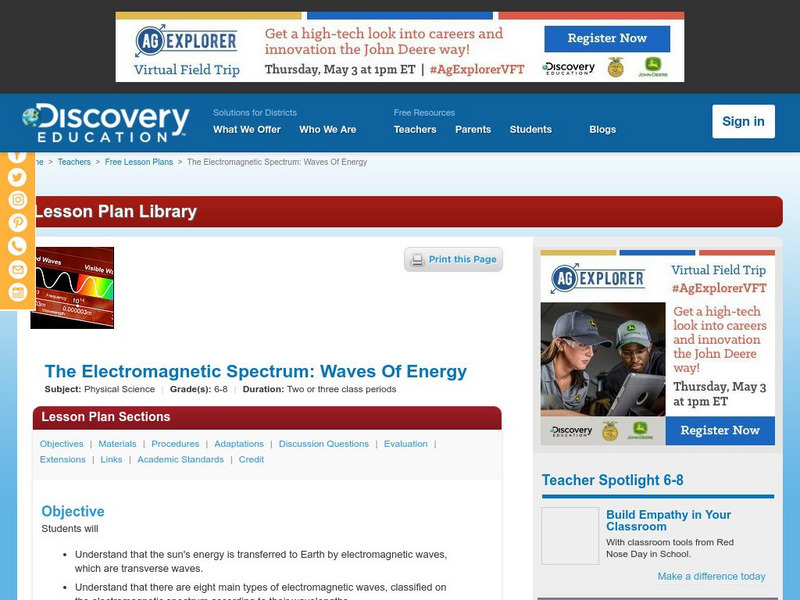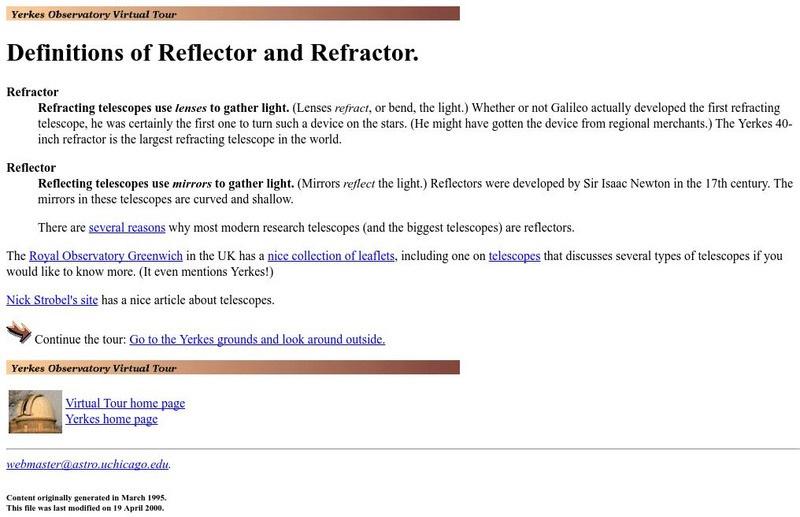Other
Abc News: Talking to Kids About the Tsunami Tragedy
How can you begin to talk to your kids about the Tsunami tragedy? This site offers insight on how to deal with this difficult topic.
Discovery Education
Discovery Education: The Em Spectrum: Waves of Energy
Students are introduced to the electromagnetic spectrum through this group research activity. Each group investigates a different wavelength range within the em spectrum and reports back to class. Discussion ideas also included.
Incorporated Research Institutions for Seismology
Iris: Seismic Reflection
A complete lesson on seismic reflection. A video, slide presentation, and practice with solutions are included.
Physics Classroom
The Physics Classroom: Physics Tutorial: Waves: The Speed of a Wave
With sample data, equations, and practice problems, students explore the concept of wave speed.
CK-12 Foundation
Ck 12: Physical Science: Wave Speed
[Free Registration/Login may be required to access all resource tools.] Definition of wave speed and how it is related to wavelength and wave frequency, how to calculate wave speed and how it is related to the medium of a wave.
CK-12 Foundation
Ck 12: Electromagnetic Spectrum
[Free Registration/Login may be required to access all resource tools.] Students learn what an electromagnetic wave is, gain a feel for the main parts of the spectrum, and work on problems involving basic properties of electromagnetic...
CK-12 Foundation
Ck 12: Chemistry Simulation: Neon Lights
[Free Registration/Login Required] Neon lights are a type of discharge tube. Observe how electrons create colored light in a hydrogen gas discharge tube. Can you figure out why hydrogen's emission spectrum contains more than one color of...
Physics Classroom
The Physics Classroom: Color Addition
This tutorial on the addition of color to light discusses the primary, complimentary, and secondary colors of light.
Pennsylvania State University
Kettering University: Vibration & Waves
A short tutorial providing general information about waves, their categories, properties and behaviors. Includes several animations and some practice questions with answers.
BBC
Bbc: Gcse Bitesize: Why Do Scientists Think That Light and Sound Are Waves?
Light travels as transverse waves and can travel through a vacuum. Sound travels as longitudinal waves and needs to travel through a solid, liquid or gas. Read about the properties of light and of sound, and learn the differences between...
Khan Academy
Khan Academy: Wave Characteristics Review
Review the characteristics of periodic transverse and longitudinal waves such as wavelength, crest, trough, amplitude, expansion, and compression.
Khan Academy
Khan Academy: Light: Electromagnetic Waves, Electromagnetic Spectrum and Photons
This article discusses the properties of electromagnetic radiation and photons.
PBS
Pbs Learning Media: Describing a Wave
This interactive lesson engages students in noticing the shape of (transverse) waves and learning how to describe and measure the amplitude and wavelength of waves.
University of Texas at Austin
The University of Texas Mc Donald Observatory: Super Gelatin
Students measure the angles of refraction of laser light traveling through gelatin, then plot their data to calculate the gelatin's index of refraction.
Khan Academy
Khan Academy: Test Prep: Mcat: Physical Processes: Sound Is a Longitudinal Wave
Discusses the physics of how sound travels. Includes a video of a volcanic eruption that demonstrates the speed of sound waves.
McREL International
Mc Rel: Whelmer #11 Learning Activity: Straw Oboes
An easy to do activity that investigates sound waves, wave length, frequency and pitch. The activity is presented in a lesson plan format that meets NSES standards.
NASA
Viewing the Violent Universe: What Are Gamma Rays?
The universe produces a broad range of light, only a fraction of which is visible to our eyes. Gamma rays are nonvisible light, which also includes x-rays, ultraviolet light, infrared radiation, and radio waves.
Lawrence Berkeley National Laboratory
Berkeley Lab: University of California: Electromagnetic Radiation
This page defines electromagnetic radiation. Included are links to more information.
Cosmo Learning
Cosmo Learning: Modern Physics: Quantum Mechanics
A collection of video lectures from a modern physics course that focuses on quantum mechanics. The course is taught at Stanford University. The course includes ten lectures that vary in length.
University of Chicago
University of Chicago: Reflector and Refractor
From the Yerkes Observatory Virtual Tour web site. Compares and contrasts reflecting and refracting telescopes. A link from the page leads to a second page which explains why most modern research telescopes are reflecting telescopes.
Simon Fraser University
Chem1 Virtual Textbook: What Is a Wave?
Acting as part of an overview on quantum theory, this section of the site answers the question, what is a wave? In addition to a definition, several examples and formulas are provided.
Simon Fraser University
Chem1 Virtual Textbook: Particles and Waves
Acting as a subtopic of the General Chemistry Virtual Textbook's section on Atoms and the Periodic Table, this site discusses wavelength and the uncertainty principle. Information is also provided on de Broglie wavelength and electron...
PBS
Nova Teachers: Einstein Revealed: What's Your Wavelength: Classroom Activity
Investigate the wavelength properties of visible light and the scattering effects of the earth's atmosphere on different wavelengths.
Trinity College Dublin
The History of Mathematics: Young
A short sketch of the life and work of Thomas Young (1773-1829 CE). Traces early upbringing and education and his scientific discoveries and contributions.


















